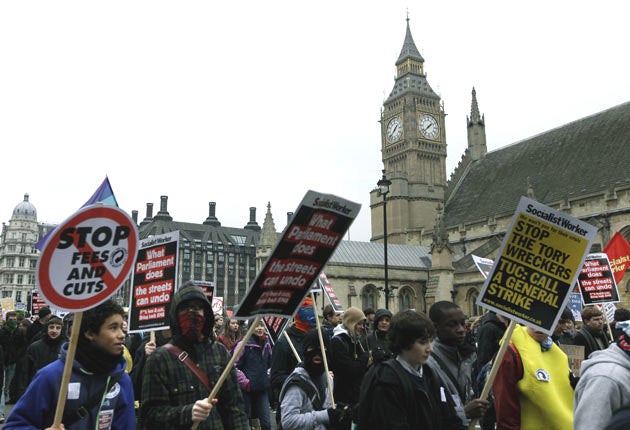More than a third of English universities ready to charge maximum fees
Institutions intend to demand the top annual tuition charge of £9,000 despite new rules permitting this only in 'exceptional circumstances'

Most of the country's leading universities are ready to charge the maximum £9,000 annual tuition fee from next year, shadow Business Secretary John Denham warned yesterday.
University sources reckon as many as 50 universities – just over a third of those in England – would be prepared to charge the maximum fee.
Mr Denham accused Universities Secretary David Willetts of being "two-faced" when he told MPs the maximum fee under new legislation would be charged only in "exceptional circumstances".
The Labour spokesman said the phrase had been omitted from draft guidance to the Office for Fair Access (Offa), the body that will regulate fees. Mr Denham, who has written to Sir Martin Harris, the director of Offa, asking him to clarify the position, told The Independent on Sunday: "Many universities have told me they believe they will be able to charge the £9,000 a year. To me, exceptional means only a tiny handful. It would not mean 20, 30 or 50."
If the number rose to 50, it would mean almost half the universities in England would be making the maximum charge. The figure is more than double the number of universities in the elite Russell Group – which represents 20 of the most research-intensive universities in the country, including Oxford and Cambridge. The group had been keen to have the cap on fees lifted entirely – a recommendation which was in the original report of Lord Browne's committee set up to review fee charges.
Mr Denham added: "It would seem David Willetts only mentioned the words 'exceptional circumstances' to get his legislation through the House of Commons." In his letter to Sir Martin, Mr Denham said: "The term 'exceptional circumstances' does not appear anywhere in the draft guidance and it appears that ministers have not asked you to take their public commitments into account in preparing your guidance. I understand that, under the Higher Education Act 2004, it is their guidance that you have to take into account, not other statements which ministers may or may not have made.
"In view of the widespread publicity that has been give to the idea that fees of £9,000 would only be available in exceptional circumstances, I think it is important to understand whether the Government has in any way asked you to take this aim into account."
He added that Mr Willetts had "quite deliberately misled the House of Commons when he said 'exceptional' and has done nothing to put his rhetoric into practice".
Mr Denham also wants clarification on the role of the Lib Dem deputy leader Simon Hughes, who has been appointed to an advisory post on university admissions policy.
A spokesman for the Department for Business, Innovation and Skills stressed that the letter to Sir Martin had been only draft guidance. Ministers were working on their final guidance over how he should treat applications to raise fees which should be finalised in the next few weeks.
A spokesman for Offa said it was not possible to comment on the letter.
Most universities at present are keeping their cards close to their chests over the fees they intend to charge until they see the fine print over the Government's advice to Offa. Under the Government's proposals, universities will be able to charge between £6,000 and £9,000 a year to students.
Thousands of protesters demonstrated in Manchester and London yesterday against tuition fees and cuts to the education budget. In Manchester there were angry scenes as protesters broke through police lines and were chased by officers on horseback. At least 14 were arrested.
In London, a march on Parliament was largely peaceful, despite a breakaway attempt to storm Millbank Tower. One student brandished a sign saying: "Ben Ali, Mubarak... Cameron, you are next."
Join our commenting forum
Join thought-provoking conversations, follow other Independent readers and see their replies
Comments
Bookmark popover
Removed from bookmarks